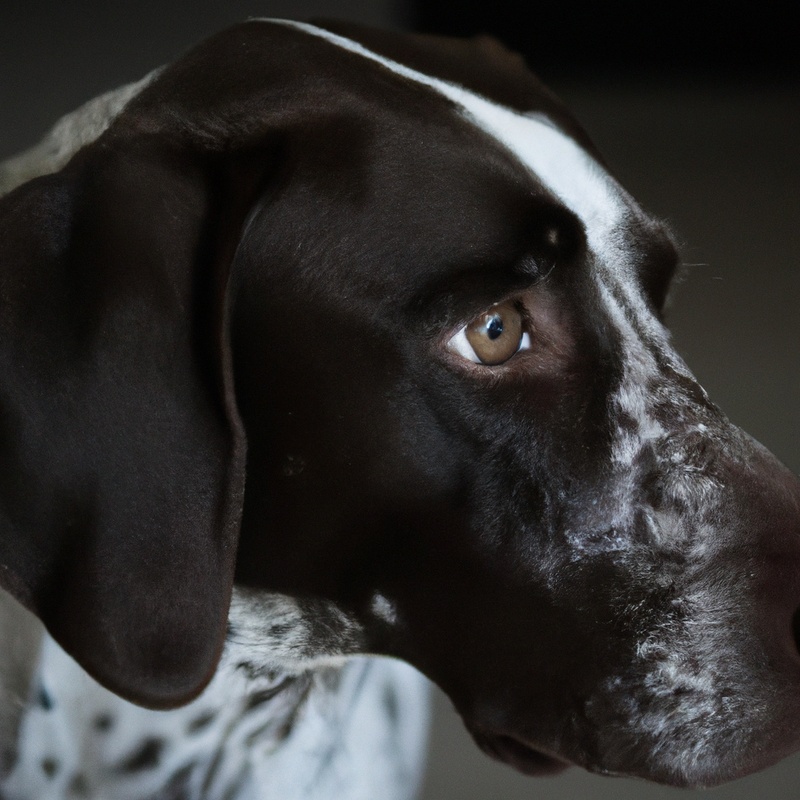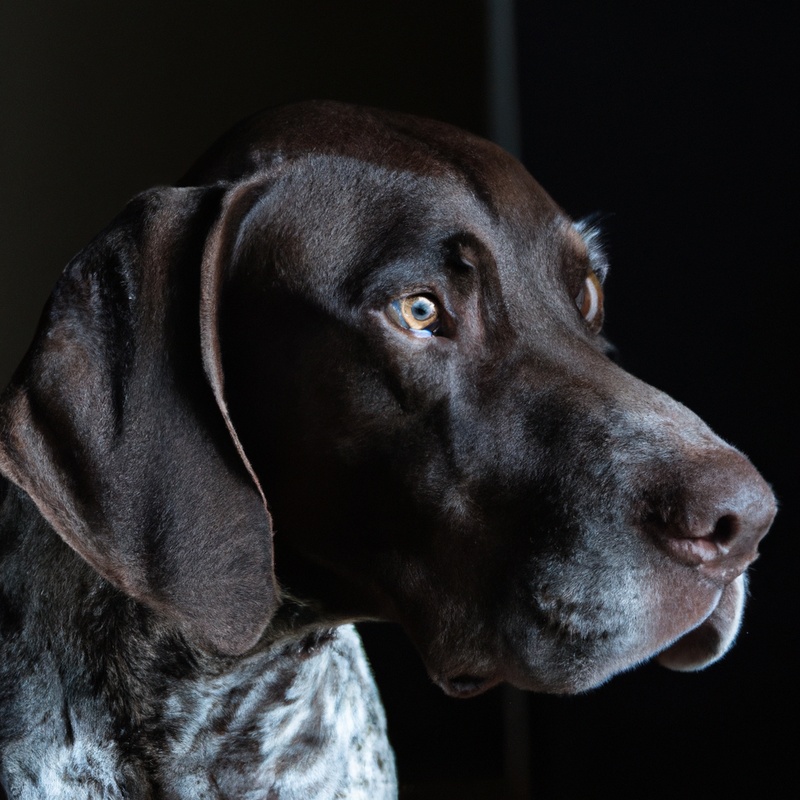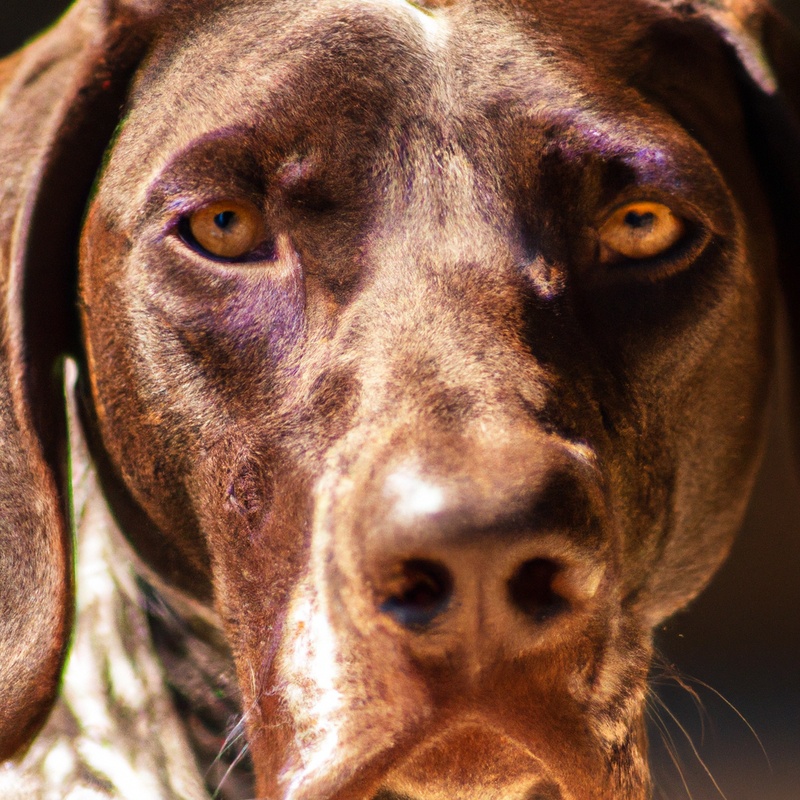What Is The Average Lifespan Of a German Shorthaired Pointer?
Key Takeaways:
- The average lifespan of a German Shorthaired Pointer typically ranges from 10 to 14 years.
- Factors such as genetics, diet, exercise, and overall care can influence a German Shorthaired Pointer’s lifespan.
- Regular veterinary check-ups, balanced nutrition, and providing mental and physical stimulation are crucial for extending the lifespan of a German Shorthaired Pointer.
- Owners should be aware of the breed’s susceptibility to certain health conditions and take necessary precautions to promote the longevity of their German Shorthaired Pointer.
Have you ever wondered just how long our furry friends can grace our lives? Well, today we’re diving into the average lifespan of a German Shorthaired Pointer (GSP), one of the most popular dog breeds around.
As an expert in canine health and genetics, I’ll be shedding some light on the factors that influence a GSP’s lifespan, from genetic predispositions to their daily habits and environment.
We’ll also uncover the typical lifespan range for these charismatic pooches and explore ways to prolong their lives and ensure their golden years are filled with health and happiness. So, let’s embark on this fascinating journey together!
| Average Lifespan of a German Shorthaired Pointer | 10-14 years |
Factors affecting lifespan
Genetic factors
Genetic factors play a significant role in determining the lifespan of a German Shorthaired Pointer. Certain genetic traits can have a positive or negative impact on their overall health and longevity.
Factors such as inherited diseases or conditions, genetic predispositions to certain illnesses, and overall genetic diversity within the breed can all influence how long a German Shorthaired Pointer lives.
Ensuring responsible breeding practices and genetic testing can help mitigate potential health issues and promote longer, healthier lives for these dogs.

Health and veterinary care
Health and Veterinary Care for German Shorthaired Pointers Providing proper health care for your German Shorthaired Pointer is essential in ensuring a long and happy life for your furry companion. Regular veterinary check-ups are crucial for early detection and prevention of any potential health issues.
This includes vaccinations, parasite control, and dental care.
German Shorthaired Pointers have a few specific health concerns that owners should be aware of. These include hip dysplasia, bloat, and certain eye disorders.
To minimize the risk of these conditions, it is advisable to choose a reputable breeder who conducts health screenings on their breeding dogs.
In addition, a balanced diet is vital for your dog’s overall health and well-being. High-quality dog food that meets the specific nutritional needs of German Shorthaired Pointers is recommended.
Regular exercise is also important to keep your dog physically and mentally stimulated.
Lastly, it’s important to keep an eye on your German Shorthaired Pointer’s weight. Obesity can lead to various health problems, including joint issues and heart disease.
Maintaining a healthy weight through proper diet and exercise can significantly improve your dog’s quality of life.
Remember, providing regular veterinary care, a nutritious diet, and regular exercise are essential in keeping your German Shorthaired Pointer healthy and happy for many years to come.
Exercise and activity level
Exercise and activity level are crucial factors that contribute to the lifespan of a German Shorthaired Pointer. These energetic dogs have a high level of endurance and require plenty of exercise to stay healthy and happy.
Regular physical activity helps to prevent obesity, promotes cardiovascular health, and strengthens their muscles.
A depletive level of physical activity can result in behavioral problems, such as destruction or excessive barking. Daily walks, runs, and interactive playtime are essential for keeping a German Shorthaired Pointer mentally stimulated and physically fit.
Providing them with sufficient exercise and activities will lead to a longer, happier life.

Nutrition and diet
Nutrition and diet play a significant role in the lifespan of a German Shorthaired Pointer. Providing a balanced and nutritious diet is essential to ensure their overall health and well-being.
Here are some key points to consider when it comes to their nutrition:
- High-quality dog food: Feed your German Shorthaired Pointer with a high-quality dog food that is specifically formulated for their breed and size. Look for a product that lists meat as the first ingredient and avoid food with artificial additives or fillers.
- Balanced diet: It is important to provide a balanced diet that includes a mix of proteins, carbohydrates, healthy fats, vitamins, and minerals. Consult with your veterinarian to determine the right proportion for your dog.
- Portion control: Overfeeding can lead to weight gain and health issues. Follow the feeding guidelines on the dog food package or seek guidance from your vet to determine the correct portion size for your German Shorthaired Pointer.
- Fresh water: Ensure that your dog always has access to fresh, clean water. Hydration is crucial for their overall health.
- Treats and snacks: Limit the number of treats and snacks you give to your German Shorthaired Pointer. Choose healthy options like fruits or vegetables, and avoid giving them human food that may be harmful to dogs.
Remember, a well-balanced and nutritious diet along with regular exercise and proper veterinary care can help ensure a longer and healthier lifespan for your German Shorthaired Pointer.
Environmental factors
Environmental factors play a significant role in determining the lifespan of German Shorthaired Pointers. Here are some key factors that can impact their longevity:
- Diet: Providing a balanced and nutritious diet is crucial for a GSP’s health and lifespan. Feeding them high-quality dog food, avoiding overfeeding, and providing fresh water can contribute to their overall well-being.
- Exercise: Regular exercise is essential for GSPs to maintain their physical and mental health. They thrive with plenty of physical activities, such as walks, runs, and playtime. Keeping them active can help prevent obesity and related health issues.
- Living conditions: A safe and comfortable environment is important for a GSP’s well-being. Providing them with adequate shelter, regular veterinary care, and keeping their living area clean can contribute to their overall health and longevity.
- Socialization: GSPs are social dogs that thrive on human interaction and companionship. Providing them with ample opportunities to socialize, including regular playdates and training classes, can promote their mental stimulation and improve their overall quality of life.
- Veterinary care: Regular veterinary check-ups, vaccinations, and preventive treatments for parasites are essential for maintaining a GSP’s health. Staying up-to-date with vaccinations, dental care, and addressing any health concerns promptly can help prolong their lifespan.
By considering and implementing these environmental factors, GSP owners can help ensure their beloved pets live long, healthy lives.

Average lifespan range
Research and studies on lifespan
Research and studies on lifespan: There have been several research studies conducted on the lifespan of German Shorthaired Pointers. These studies have shown that the average lifespan of this breed typically ranges from 10 to 14 years.
However, it is important to note that individual lifespans can vary depending on various factors such as genetics, diet, exercise, and overall health care.
It is always recommended to provide regular veterinary check-ups, a balanced diet, and ample exercise to ensure the best possible lifespan for your German Shorthaired Pointer.
Typical lifespan range for German Shorthaired Pointers
Typical lifespan range for German Shorthaired Pointers: German Shorthaired Pointers typically live between 10 to 14 years. However, it’s important to note that every dog is unique and factors like genetics, diet, exercise, and overall health can influence their lifespan.
Regular veterinary care, a balanced diet, and proper exercise can help ensure that your German Shorthaired Pointer has the best chance for a longer, healthier life.
Remember, providing a loving and supportive environment is also crucial for their overall well-being.
Variations within the average lifespan range
Variations within the average lifespan range: The average lifespan range for German Shorthaired Pointers is around 10 to 14 years. However, it’s important to note that individual dogs may vary within this range.
Factors such as genetics, diet, exercise, and overall health can influence a dog’s lifespan.
Some German Shorthaired Pointers may live closer to the lower end of the range, while others may live longer and reach the upper end. It’s also worth mentioning that proper care and regular veterinary check-ups can contribute to a dog’s overall well-being and potentially extend their lifespan.
Prolonging the lifespan
Importance of regular veterinary check-ups
Regular veterinary check-ups are crucial for the health and well-being of your German Shorthaired Pointer. These check-ups allow veterinarians to detect and treat any potential health issues early on, which can help prolong your dog’s lifespan.
During these appointments, your vet will examine your dog’s overall health, administer necessary vaccinations and preventive medications, and screen for any underlying conditions through blood tests and other diagnostic tools.
By scheduling regular check-ups, you can ensure that any health problems are addressed promptly and help your German Shorthaired Pointer live a long and healthy life.
Appropriate exercise and mental stimulation
German Shorthaired Pointers have an average lifespan of around 10 to 12 years. To ensure their overall well-being and promote a long, healthy life, it’s important to provide them with appropriate exercise and mental stimulation.
Regular physical exercise is crucial for maintaining their weight, muscle tone, and cardiovascular health.
This can be achieved through activities like daily walks, jogging, hiking, or engaging in canine sports such as agility or dock diving. Mental stimulation is equally important to prevent boredom and behavioral problems.
Providing puzzle toys, obedience training, scent work, and interactive play sessions can help keep their minds sharp and satisfied.
Additionally, social interaction with other dogs and humans is beneficial for their mental and emotional well-being. By incorporating appropriate exercise and mental stimulation into their daily routine, German Shorthaired Pointers can lead fulfilling and happy lives.
Balanced and nutritious diet
Balanced and nutritious diet is key to prolonging the average lifespan of a German Shorthaired Pointer. Providing high-quality dog food that meets their specific nutritional needs is essential.
Opt for a diet that includes lean protein, whole grains, and a variety of fruits and vegetables.
Avoid excess amounts of fat, salt, and processed ingredients. Fresh water should always be available.
Additionally, consider adding supplements like omega-3 fatty acids for joint health.
Regular feeding schedule and portion control are important to maintain a healthy weight. Be sure to consult with your veterinarian for personalized dietary recommendations.
Preventive measures for common health issues
Preventive measures are important for maintaining the health of your German Shorthaired Pointer. Here are some tips to help prevent common health issues:
- Regular vet check-ups: Schedule regular check-ups with your veterinarian to catch any potential health concerns early on.
- Vaccinations: Ensure your dog is up to date on vaccinations, including those for distemper, parvovirus, and rabies.
- Weight management: Maintain a healthy weight for your dog to reduce the risk of obesity-related health issues. This can be achieved through a balanced diet and regular exercise.
- Dental care: Brush your dog’s teeth regularly and consider providing dental treats or toys to promote good oral hygiene.
- Parasite prevention: Protect your dog against fleas, ticks, and heartworms through regular preventative measures such as regular medication and maintaining a clean living environment.
- Exercise and mental stimulation: Keep your German Shorthaired Pointer physically active and mentally engaged to maintain their overall well-being.
Remember, prevention is key when it comes to ensuring a long and healthy life for your German Shorthaired Pointer. By following these measures, you can help reduce the risk of common health issues and keep your furry friend happy and thriving.
Creating a safe and stimulating environment
Creating a safe and stimulating environment is key to ensuring the well-being and happiness of your German Shorthaired Pointer. Here are some tips to help you achieve this:
- Secure your space: Make sure your home and yard are securely fenced to prevent your dog from wandering off or getting into potentially dangerous situations.
- Remove hazards: Take a thorough look around your living space and get rid of any potential hazards such as toxic plants, chemicals, small objects, or sharp edges that your dog could accidentally ingest or injure themselves on.
- Provide plenty of exercise: German Shorthaired Pointers are active breeds and require regular exercise to stay healthy and happy. Take your dog for daily walks or runs, play games of fetch, or engage in activities that challenge them mentally and physically.
- Mental stimulation: Along with physical exercise, it’s important to provide mental stimulation for your dog. Offer puzzle toys, obedience training sessions, or enrichment games that can keep their mind engaged and prevent boredom.
- Socialization: Expose your German Shorthaired Pointer to a variety of situations, people, and other animals from an early age. This will help them become well-adjusted and confident in different environments.
- Provide a comfortable living space: Ensure your dog has a cozy bed, clean water, and a designated space where they can retreat to when they need some downtime.
By following these guidelines, you can create a safe and stimulating environment for your German Shorthaired Pointer, promoting their overall well-being and potentially prolonging their lifespan.
Common health concerns
Hip dysplasia
Hip dysplasia is a common health concern among German Shorthaired Pointers. It is a condition in which the hip joint does not develop properly, leading to instability and discomfort.
Symptoms include limping, difficulty in rising, and pain during exercise.
Regular check-ups with a veterinarian are needed to monitor the condition. Management methods include weight control, exercise moderation, and medication if necessary.
Surgery may be an option in severe cases.
Early detection and proper care can help improve the dog’s quality of life.
Cancer
Cancer can affect German Shorthaired Pointers, just like any other breed of dogs. Some common types of cancer in this breed include lymphoma, mast cell tumors, and osteosarcoma.
Symptoms of cancer may vary depending on the type and stage, but can include lumps, weight loss, decreased appetite, and difficulty breathing.
Early detection is important for a better prognosis. If you notice any concerning signs, it’s crucial to consult a veterinarian for appropriate diagnosis and treatment options.
Hypothyroidism
Hypothyroidism is a common health concern among German Shorthaired Pointers. It occurs when the thyroid gland doesn’t produce enough thyroid hormone.
Symptoms of hypothyroidism may include weight gain, hair loss, fatigue, and skin issues.
To manage this condition, your veterinarian may prescribe synthetic thyroid hormone medication to help regulate hormone levels. Regular check-ups and blood tests are important to monitor your dog’s thyroid function.
With proper treatment and care, many dogs with hypothyroidism can lead happy and healthy lives.
Progressive retinal atrophy (PRA)
Progressive retinal atrophy (PRA) is a genetic eye disorder that affects certain dog breeds, including German Shorthaired Pointers. It is characterized by the degeneration and death of photoreceptor cells in the retina, leading to gradual vision loss and eventual blindness.
PRA is an inherited condition, meaning it is passed down from one or both parents to their offspring.
There is no cure for PRA, but early detection through regular eye examinations can help manage the condition and slow down its progression. It is important for breeders to screen their dogs for PRA to prevent the spread of this condition in the German Shorthaired Pointer population.
Bloat (gastric dilation volvulus)
Bloat, also known as gastric dilation volvulus, is a common health concern in German Shorthaired Pointers. It is a serious condition where the dog’s stomach becomes distended and then twists on itself.
This can lead to a blockage of blood flow, which is life-threatening.
It is important to recognize the signs of bloat, which include a distended abdomen, restlessness, unproductive retching or vomiting, and signs of discomfort. If you suspect your German Shorthaired Pointer is experiencing bloat, it is crucial to seek immediate veterinary care as this condition requires emergency treatment.
Signs of aging in German Shorthaired Pointers
Physical changes
Physical changes in German Shorthaired Pointers can be observed as they age. These changes include graying or whitening of the coat, especially around the face and muzzle, as well as a loss of muscle mass and tone.
The skin may become looser and have a less firm feel.
Additionally, their eyesight and hearing may start to decline, and they may become slower and less agile. It is important to monitor these physical changes and provide adequate care and support to maintain their overall health and well-being.
Behavioral changes
Behavioral changes can occur in aging German Shorthaired Pointers. These changes may include decreased energy levels, increased sleep, and possible changes in their mood and behavior.
They may become more easily irritated or disoriented, and may show less interest in activities they once enjoyed.
It is important to closely monitor and adapt to these changes, providing them with a comfortable and supportive environment. Regular visits to the veterinarian can help address any health concerns and ensure their well-being throughout their lifespan.
Cognitive decline
Cognitive decline is a natural occurrence as German Shorthaired Pointers age. It can involve changes in memory, learning abilities, and problem-solving skills.
They might become more easily confused or disoriented, and their overall judgement may decline.
Additionally, they may experience difficulty in understanding commands or following routines. It’s important for owners to be patient and understanding during this stage of their dog’s life.
Mental stimulation, such as puzzle toys and regular training sessions, can help to slow down cognitive decline in German Shorthaired Pointers.
Care for senior German Shorthaired Pointers
Adjusting exercise and activity level
Adjusting exercise and activity level is an important aspect of caring for senior German Shorthaired Pointers. As they age, their energy levels and endurance may decrease.
It is crucial to provide them with regular exercise to keep them healthy and maintain their muscle tone.
However, it is equally important to be mindful of their limitations and not overexert them. Shorter walks, gentle play sessions, and mentally stimulating activities can help keep them engaged without straining their bodies.
Regular veterinary check-ups can provide guidance on appropriate exercise routines for senior German Shorthaired Pointers.
Special dietary considerations
Special Dietary Considerations: As German Shorthaired Pointers age, it’s important to consider their dietary needs. Here are some key considerations:
- Calorie intake: Older dogs tend to have lower activity levels, so it’s important to adjust their calorie intake accordingly to prevent weight gain.
- Protein and fat content: The protein and fat levels in their diet should be moderate to support their aging muscles and joints. Consult with a veterinarian to determine the right balance.
- Joint health: Supplements such as glucosamine and chondroitin can help promote healthy joints and alleviate any arthritis symptoms.
- Digestive health: Older dogs may have more sensitive stomachs. Consider feeding them smaller, more frequent meals and choosing easily digestible foods.
- Hydration: Adequate water intake is essential for overall health, especially in older dogs. Ensure fresh water is always available.
Remember, each dog is unique, so it’s important to consult with a veterinarian to create a personalized diet plan for your senior German Shorthaired Pointer.
Regular veterinary check-ups and screenings
Regular veterinary check-ups and screenings are essential for the health and well-being of your German Shorthaired Pointer. These check-ups allow the vet to monitor your dog’s overall health, catch any potential issues early on, and provide necessary vaccinations.
During these visits, the vet will perform a physical examination, check for parasites, administer vaccines, and may recommend additional tests or screenings based on your dog’s age and specific needs.
Regular check-ups help ensure that any health concerns are addressed promptly, helping your German Shorthaired Pointer live a long and healthy life.
Managing chronic illnesses and pain
Managing chronic illnesses and pain in German Shorthaired Pointers is crucial for ensuring their well-being and quality of life. Regular veterinary check-ups are essential for early detection and treatment of any underlying health conditions.
Medications prescribed by the vet should be administered as directed, and any side effects should be reported.
Providing a comfortable and supportive environment, ensuring a balanced diet, and engaging in regular low-impact exercise are also important in managing chronic illnesses and pain. Additionally, alternative therapies such as acupuncture or physical therapy may be beneficial in alleviating pain and improving mobility.
Regular communication with the vet and implementing appropriate management strategies can greatly help in managing chronic illnesses and pain in German Shorthaired Pointers.
Providing mental stimulation and companionship
When it comes to caring for senior German Shorthaired Pointers, providing mental stimulation and companionship is crucial. Mental enrichment activities, like puzzle toys and interactive games, can help keep their minds sharp and prevent cognitive decline.
Additionally, spending quality time with them, such as going for walks or engaging in play sessions, helps them feel loved and valued.
This companionship is essential for their overall well-being and can contribute to a happier and healthier life for your senior German Shorthaired Pointer.
Promoting a happy and healthy lifespan
Early socialization and training
Early socialization and training play a significant role in the development of a German Shorthaired Pointer. Introducing your pup to different people, animals, and environments at a young age helps them become well-rounded and confident pets.
Training should start early and focus on basic commands, as well as leash training and proper social behavior.
Consistency and positive reinforcement are key to ensure a well-behaved and obedient GSP. Engaging in early socialization and training will set the foundation for a happy and well-adjusted companion.
Mental and physical exercise throughout life
Mental and physical exercise are essential for promoting a happy and healthy lifespan for German Shorthaired Pointers. Dogs of this breed are known for their high energy levels and intelligence, so it’s important to provide them with plenty of mental stimulation and physical activity throughout their lives.
To keep your German Shorthaired Pointer mentally sharp, consider engaging in activities like puzzle toys, obedience training, and interactive games.
These activities not only keep their minds active, but also help to strengthen the bond between you and your pet. In terms of physical exercise, German Shorthaired Pointers require regular, vigorous exercise to stay healthy and happy.
Activities like long walks, jogging, hiking, and playing fetch are all excellent ways to meet their exercise needs.
A tired dog is usually a calm and well-behaved dog, so providing adequate physical exercise can also contribute to your dog’s overall well-being and behavior. Remember to tailor the exercise routine to your dog’s age and health condition.
Puppies may have shorter bursts of exercise, while older dogs may need lower impact activities.
Regular exercise throughout their lives will help ensure that your German Shorthaired Pointer remains fit, mentally stimulated, and enjoys a long and fulfilling lifespan.
Maintaining a healthy weight
Maintaining a healthy weight is important for the overall well-being of a German Shorthaired Pointer. Here are some tips to achieve this:
- Provide a balanced diet: Ensure that your dog is getting the right amount of nutrients without overfeeding. Consult with a veterinarian to determine the appropriate portion sizes and the best food options for your dog’s specific needs.
- Regular exercise: Engage your dog in daily exercise routines, such as walks, runs, or playtime. This will help them burn calories and maintain a healthy weight. Be mindful of their energy levels and adjust the duration and intensity of activities accordingly.
- Monitor treats: Treats can quickly add up in calories, so be cautious when giving them to your dog. Opt for healthy and low-calorie treats instead of high-calorie ones. Remember, moderation is key.
- Avoid table scraps: Human food can be tempting for dogs, but it’s important to resist giving them table scraps. Many human foods can be harmful and contribute to weight gain. Stick to a nutritious and balanced diet specifically designed for dogs.
- Regular vet check-ups: Regular visits to the veterinarian can help monitor your dog’s weight and overall health. They can provide personalized advice and recommend any necessary adjustments to their diet or exercise routine.
By following these tips, you can help your German Shorthaired Pointer maintain a healthy weight and improve their overall quality of life. Remember, a healthy weight promotes a happy and active lifestyle for your furry friend.
Preventive measures against injuries and accidents
Preventive measures against injuries and accidents are crucial for ensuring the well-being and safety of German Shorthaired Pointers. Here are some simple steps you can take:
- Provide a secure environment: Make sure your home is free from hazards like loose electrical cords, chemicals, or sharp objects that your dog could potentially swallow or injure themselves on.
- Supervise outdoor activities: When your German Shorthaired Pointer is outside, always keep an eye on them. Secure your yard with a fence to prevent them from running into the road or wandering off.
- Use sturdy leashes and harnesses: When taking your dog for walks, use a well-fitted leash and harness to maintain control and prevent them from bolting or getting tangled in their surroundings.
- Proper training: Invest time in training your dog to respond to basic commands like “sit,” “stay,” and “come.” This will help keep them safe in potentially dangerous situations.
- Regular exercise: Engage your German Shorthaired Pointer in regular exercise to keep them physically fit and mentally stimulated. A tired dog is less likely to engage in risky behaviors that may lead to injuries.
- Regular vet check-ups: Schedule regular check-ups with your veterinarian to ensure your dog is in good health. Regular vaccinations and preventive measures against diseases can help prevent accidents or complications.
Remember, preventing injuries and accidents is an ongoing process. Stay informed about potential hazards and adapt your preventive measures accordingly.
Regular teeth cleaning and oral care
Regular teeth cleaning and oral care are essential for maintaining your German Shorthaired Pointer’s overall well-being. Neglecting their dental health can lead to various oral problems such as plaque buildup, gum disease, and tooth decay.
To prevent these issues, it’s important to establish a routine of regular teeth cleaning.
Brush your dog’s teeth using a dog-specific toothbrush and toothpaste recommended by your veterinarian. Aim to brush their teeth at least 2-3 times a week.
Additionally, provide them with chew toys and dental treats that promote dental hygiene.
Regular dental check-ups with your vet are also vital to monitor your dog’s oral health. By prioritizing your German Shorthaired Pointer’s dental care, you can help them maintain a happy and healthy lifespan.
Final Verdict
Understanding the factors that affect the lifespan of a German Shorthaired Pointer can help owners provide the best care for their beloved companions. From genetics and veterinary care to exercise, nutrition, and the environment, there are numerous considerations that contribute to a dog’s lifespan.
By prioritizing regular check-ups, proper exercise, a balanced diet, preventive measures, and creating a safe and stimulating environment, owners can prolong the lifespan and promote a happy and healthy life for their German Shorthaired Pointers.
With this knowledge, trust in the reliability of this information to guide you in providing the best care for your furry friend.







